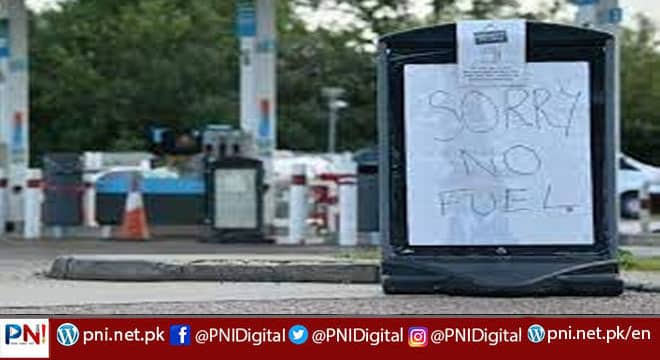London, Sept 27 (AFP/APP):Desperate motorists queued up at fuel pumps across Britain on Monday, draining tanks, fraying tempers and prompting calls for the government to use emergency powers to give priority access to healthcare and other essential workers.
The government says a lack of tanker drivers to deliver fuel and unprecedented demand is behind the crisis.
At the weekend it made a drastic U-turn on tighter post-Brexit immigration policy, offering short-term visa waivers to foreign truckers to help plug the shortfall.
Fuel operators, including Shell, BP and Esso, said there was “plenty of fuel at UK refineries” and expected demand to return to normal levels in days, easing pressure.
“We would encourage everyone to buy fuel as they usually would,” they added in a joint statement.
But long queues were seen outside filling stations, even overnight, frustrating drivers and stoking concern about the effects on the wider economy.
“People are desperate. If I don’t get petrol now, I can’t get work anymore today,” one driver, David Hart, told AFP as he queued at a garage in London after a fruitless search at the weekend.
Britain’s biggest public sector union, Unison, said key workers, including doctors, nurses, teaching and police staff, should be given priority access rather than having to wait in line.
“The government could solve this problem now by using emergency powers to designate fuel stations for the sole use of key workers,” said general secretary Christina McAnea.
Medical bodies have already said some healthcare staff have struggled to get to work, while schools have warned that online teaching could resume if teachers are unable to reach their classrooms.
At petrol stations across London, southeast England and beyond, motorists hoping to fill up their tanks were met with taped off pumps, and signs stating “Sorry, no fuel”.
The Petrol Retailers Association said almost half of the UK’s 8,000 fuel pumps had run out of petrol on Sunday, blaming “panic-buying, pure and simple” for the issue.
– Brexit link –
Critics blame government inaction on tackling historic shortages of lorry drivers after Britain’s departure from the European Union in January and the pandemic, which saw many foreign truckers leave the country.
As well as fuel deliveries, the shortage has led to empty supermarket shelves and raised fears about deliveries of food and toys for Christmas.
Germany’s weekend election winner Olaf Scholz linked the problems directly to Brexit and said low wages in the sector could make the job less appealing.
“We worked hard to convince the British not to leave the Union,” Scholz said.
The situation has evoked the dark days of the 1970s, when energy supply problems led to a three-day working week and fuel rationing in Britain.
It is reminiscent also of late 2000, when people protesting over high fuel prices blockaded oil refineries, bringing the country to a virtual standstill for weeks.
The government called for calm and urged people to buy petrol as normal.
Prime Minister Boris Johnson’s spokesman said it did not rule out calling up troops to deliver fuel if the situation deteriorated.
“As a responsible government, we are taking the preparatory steps necessary should further measures be needed,” he told reporters.
– Too little, too late? –
The government, which campaigned during Brexit for an end to European free movement, is banking on a short-term visa waiver to plug the gap in drivers, which it says is a Europe-wide problem.
It said on Saturday it will issue up to 10,500 temporary work visas from next month to December 24 to lorry drivers and poultry workers to ease chronic staff shortages.
The head of the British Poultry Council, Richard Griffiths, welcomed the move but warned it could be too little, too late to avert food shortages.
“Supply chains are not something that can be simply switched on and off, so plans for production are already well underway and the necessary cutbacks due to ongoing labour shortages have already been made,” he added.
Edwin Atema, of the Dutch FNV union which represents lorry drivers across Europe, told BBC radio the three-month visa programme was not enough.
“More is needed and I think the EU workers we speak to will not go to the UK for a short-term visa to help UK out of the shit they created for themselves,” he told BBC radio.
Follow the PNI Facebook page for the latest news and updates.









